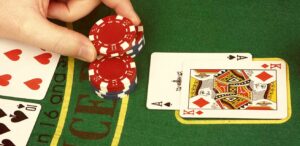Glossary Term
Double Down
Double Down
Used In: Baccarat, Bingo, Blackjack, Craps, eSports Betting, Football, Poker, Roulette, Sports Betting
Introduction to Double Down
In the context of gambling, the term “Double Down” holds significant weight, signifying a strategic maneuver employed by players to enhance their potential winnings. This maneuver, commonly associated with games like blackjack, involves the decision to double the initial bet in exchange for receiving one additional card. The concept of Double Down encapsulates both risk and reward, as players aim to capitalize on favorable circumstances while acknowledging the heightened stakes involved. Understanding the nuances of Double Down is essential for any serious gambler, as it can serve as a powerful tool for maximizing profits in certain gaming scenarios. In this comprehensive guide, we delve into the intricacies of Double Down, exploring its origins, mechanics, strategies, and practical applications in various gambling contexts.
Origin and History
The origins of the term “Double Down” in gambling trace back to the game of blackjack, which has roots dating back to the 17th century. While the exact historical moment of its inception remains elusive, the concept of doubling one's bet for an additional card became a prominent feature of the game over time. Blackjack, also known as “21,” gained widespread popularity in casinos across the United States during the 20th century, further cementing the practice of Double Down as a fundamental aspect of the game. The term itself likely originated from the act of doubling one's wager, symbolizing a bold and assertive move in pursuit of victory. Over the years, Double Down has evolved beyond blackjack, finding application in various other casino games and gambling scenarios, where players seek to optimize their chances of success by doubling their bets strategically.


Explanation of Double Down
Double Down, in the context of gambling, refers to a deliberate decision made by a player to double their original wager during a hand, typically in exchange for receiving one additional card. This strategic move is primarily associated with games like blackjack, where players aim to improve their hand's strength while simultaneously increasing their potential winnings. When a player opts to Double Down, they signal confidence in their hand and willingness to take on additional risk for the opportunity of greater rewards. It's important to note that not all hands are suitable for a Double Down; players must assess factors such as their hand value, the dealer's visible card, and the specific rules of the game before making this strategic maneuver. Double Down exemplifies the calculated risk-taking inherent in gambling, where players weigh the probabilities and potential outcomes to make informed decisions aimed at maximizing their chances of success.
How Double Down Works in Different Games
While most commonly associated with blackjack, the concept of Double Down can be found in various other casino games, each with its own set of rules and dynamics. In blackjack, players typically have the option to Double Down after receiving their initial two cards, but before any additional cards are drawn. By doubling their original wager, players commit to receiving precisely one more card from the dealer. This additional card can significantly alter the outcome of the hand, potentially turning a marginal hand into a winning one or vice versa. In games like certain variations of poker or baccarat, similar strategies involving doubling bets may exist, but under different terminology or rules. For instance, in some poker variants, players may have the option to “raise” their bet, effectively doubling it, during specific betting rounds. Similarly, in baccarat, players may have the option to increase their wager on the player or banker hand before cards are dealt, effectively doubling down on their chosen outcome.
Regardless of the specific game, the fundamental principle of Double Down remains consistent: players voluntarily increase their bet size in exchange for one additional card or a favorable outcome. Mastery of this strategic maneuver requires an understanding of game rules, probabilities, and optimal timing, allowing players to leverage Double Down effectively across a variety of gambling contexts.
Strategy and When to Double Down
The decision to Double Down in gambling requires careful consideration of various factors, including the player's hand, the dealer's visible card, and the specific rules of the game. A strategic approach to Double Down involves identifying opportune moments where the potential rewards outweigh the risks.
For example, if a player is dealt a hand with a total value of 11 (e.g., 6 and 5) and the dealer's visible card is a 4, it may be advantageous to Double Down. By doubling their initial bet, the player increases their potential winnings if they draw a 10-value card, resulting in a strong hand totaling 21.
Similarly, in certain poker variants, players may opt to increase their bet size during specific betting rounds if they believe they have a strong hand relative to their opponents. For instance, if a player holds a pair of Aces in Texas Hold'em and believes their hand is superior to their opponents' holdings, they may choose to “raise” their bet, effectively doubling it, to extract maximum value from the hand. Ultimately, the decision to Double Down should be based on a combination of game dynamics, probability calculations, and intuition. By employing strategic thinking and recognizing favorable situations, players can maximize the potential benefits of Double Down while minimizing the associated risks.
Advantages and Risks of Double Down
Double Down presents both distinct advantages and inherent risks for players in gambling scenarios. One of the primary advantages is the potential to increase winnings significantly when the player believes they have a strong hand. By doubling their bet and receiving one additional card, players stand to capitalize on favorable circumstances and maximize their profits.
For example, in blackjack, successfully doubling down on a hand with a total value of 11 against a dealer's weak card can lead to a substantial payout if the player draws a 10-value card, resulting in a winning hand totaling 21.
However, along with the potential rewards, Double Down also entails increased risk. Players must acknowledge that doubling their bet amplifies the potential losses if the subsequent card does not improve their hand. In situations where the additional card results in a weaker hand or a bust (exceeding a total value of 21), the player forfeits the doubled portion of their bet, leading to a larger loss than if they had not doubled down.
Furthermore, the decision to Double Down is not without uncertainty. Even when players assess the probabilities and game dynamics carefully, outcomes remain subject to chance, and there is no guarantee of success. Therefore, while Double Down offers the potential for higher returns, it requires a calculated approach and acceptance of the associated risks. Players must weigh the potential advantages against the inherent uncertainties before committing to this strategic maneuver in gambling scenarios.
Examples of Double Down in Action
To illustrate the practical application of Double Down in gambling, let's delve into several scenarios across different games where players strategically employ this maneuver to their advantage. These examples will showcase the diverse contexts in which Double Down can be utilized, along with the potential outcomes and considerations involved.
| Game | Player's Hand | Dealer's Visible Card | Decision | Outcome |
|---|---|---|---|---|
| Blackjack | Hand: 11 (6, 5) | Dealer: 4 | Double Down | Draws 10, total: 21. Player wins |
| Poker | Hand: Pair of Aces | Opponents' Holdings | Double Down | Raises bet, opponents fold. Player wins |
| Baccarat | Bet: Player | Opponent: Banker | Double Down | Banker wins. Player loses initial bet |
In the first example, a player in a game of blackjack is dealt a hand totaling 11 (consisting of a 6 and a 5), while the dealer's visible card is a 4. Recognizing the opportunity to capitalize on a potentially strong hand, the player opts to Double Down. The player receives a 10-value card, resulting in a total of 21, beating the dealer's hand and winning the round.
Moving on to the realm of poker, consider a scenario where a player holds a pair of Aces in a game of Texas Hold'em. Assessing the strength of their hand relative to their opponents' holdings, the player decides to Double Down by raising their bet. In response to the increased wager, their opponents fold, allowing the player to claim the pot without further contestation.
Lastly, in a game of baccarat, a player places a bet on the “Player” hand, anticipating a favorable outcome. However, the banker's hand prevails, resulting in a loss for the player's initial wager. Despite the unsuccessful outcome, the player's decision to Double Down reflects a calculated risk undertaken in pursuit of potential rewards.
These examples underscore the strategic nature of Double Down in gambling, highlighting the importance of assessing probabilities, game dynamics, and opponent behavior when making this tactical maneuver. Whether in blackjack, poker, baccarat, or other casino games, Double Down offers players the opportunity to seize control of the action and enhance their chances of success when employed judiciously.
Conclusion
Double Down stands as a fundamental concept in the realm of gambling, representing a strategic maneuver that can significantly impact the outcome of a game. From its origins in blackjack to its application across various other casino games, Double Down epitomizes the calculated risk-taking inherent in gambling, where players weigh the potential rewards against the heightened stakes involved. While Double Down offers the potential for increased winnings, it also carries inherent risks that players must acknowledge and mitigate. Success in utilizing Double Down hinges on a combination of skill, intuition, and strategic thinking, as players navigate the complexities of each gaming situation. Ultimately, mastering Double Down requires a nuanced understanding of probabilities, game mechanics, and optimal timing. By equipping themselves with the knowledge and insight provided in this guide, players can enhance their gaming experience and maximize their chances of success when employing Double Down in gambling scenarios. Whether in blackjack, poker, baccarat, or other casino games, Double Down remains a powerful tool in the arsenal of any discerning gambler, offering the potential for thrilling victories and lucrative rewards.
The Top Online Casinos for Gambling
To assist players in their quest for the best online casinos, reputable gambling authorities and industry experts meticulously evaluate and rank platforms based on various criteria such as licensing, game variety, user experience, payment options, customer support, and promotional offers. Several online casinos consistently rank among the top in the industry, offering a comprehensive suite of gaming options, secure banking methods, and responsive customer service.
No results were found!


Author
Gabriela Kirilova | Content Optimization Director






